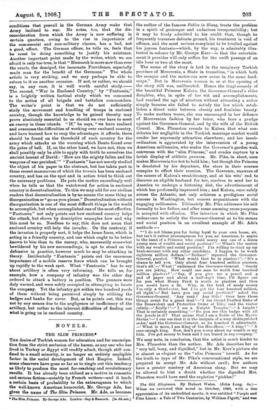NOVELS.
THE SLIM PRINCESS.* Tina desire of Turkish women for education and for emancipa- tion from the strict seclusion of the harem, as any one who has lived in Turkey or Egypt will readily admit, though still con- fined to a small minority, is no longer an entirely negligible factor in the social development of that Empire. Indeed, some observers have gone so far as to single out this tendency as likely to produce the most far-reaching and revolutionary results. It has already been utilised as a motive in romantic and serious fiction—notably by French writers—and it lends a certain basis of probability to the extravaganza to which the well-kuown American humourist, Mr. George Ade, has given the name of The Slim Princess, Mr. Ade, as becomes • The SUM Priuoss. By George Ade. London : Gay & Hancock. ES.. a& net.] the author of the famous Fables in Slang, treats the problem in a spirit of grotesque and audacious irresponsibility; but it may be freely admitted to his credit that, though he
frequently traverses delicate ground, his treatment is void of offence, and the most serious complaint to be levelled against his joyous fantasia—which, by the way, is admirably, Mug- tinted in colours by Mr. George Kerr—is that the entertain- ment it provides will only suffice for the swift passage of an idle hour or two at the most.
The scene of the story is laid in the imaginary Turkish province of Morovenia, a State in transition, "in which both the mosque and the motor-car now occur in the same land- scape." But in Morovenia woman is, or at the opening of the story still was, unliberated. Hence the tragi-comedy of the beautiful Princess Kalora, the Governor-General's elder daughter, who, in spite of her wit and accomplishments, had reached the age of nineteen without attracting a suitor simply because she failed to satisfy the law which estab- lishes a direct ratio between obesity and feminine beauty.
To make matters worse, she was encouraged in her defiance of Morovenian fashion by her tutor, who bore a grudge against the Governor-General, and by the wife of the British Consul. Mrs. Plumston reveals to Kalora that what con- stitutes her negligible in the Turkish marriage market would
render her supremely attractive elsewhere ; and her insub- ordination is aggravated by the intervention of a young
American millionaire, who scales the Governor's garden wall, converses with the "slim Princess," and evades capture by a lavish display of athletic prowess. Mr. Pike, in short, soon makes Morovenia too hot to hold him ; but though the Princess is desolated by his departure, the stars in their courses conspire to effect their reunion. The Governor, unaware of the causes of Kalora's recalcitrancy, and at his wits' end to discover an eligible husband for her, resolves to send her to America to undergo a fattening diet, the advertisement of which has profoundly impressed him ; and Kalora, once safely across the Atlantic, not only achieves a prodigious social success in Washington, but renews acquaintance with the engaging millionaire. Ultimately Mr. Pike addresses his suit formally to her father, and after some amusing cross-purposes is accepted with effusion. The interview in which Mr. Pike endeavours to satisfy the Governor-General as to his means and social position is an excellent example of Mr. Ade's methods :—
"I do not blame you for being loyal to your own home, sir, but isn't it rather presumptuous for you, an American, to aspire to the hand of a Princess who could marry any one of a dozen young men of wealth and social position ? '—` What's the matter with my wealth and social position ? I'm willing to stack up my bank-account with any other candidate. I happen to be worth eighteen million dollars,'—' Dollars !' repeated the Governor-
General, puzzled. What would that be in piasters It's a shame to tell you. Only about four hundred million piastera, that's What ! ' exclaimed the Governor-General. Surely you are joking. How could one man be worth four hundred
million plasters? Say, if you give me a pencil and a pad of paper and about a half-day's time, I'll figure out for you what Henry Frick is worth in piasters and then you would have a fit. Why, in the land of ready money I'm only a third-rater, but I've got the four hundred million, all right.'—' But have you any social position ? ' asked the Governor-General. Any rank ? Any title ? Over here those things count for a great deal.'—' I am Grand Exalted Ruler of the Benevolent and Protective Order of Elks,' said the visitor calmly.—' Really I am a Knight Templar.'—` A knight ? That is certainly something.'—' Do you see this badge with all the jewels in it ? That means that I am a Noble of the Mystic Shrine.'—' I can see that it is the insignia of a very distinguished order,' said the Governor-General, as he touched it admiringly. = What is more, I am King of the Hoo-Hoos.'—' A king ?'--` A sure-enough king. Now, don't you worry about my wealth or my title. I've got money to burn and I can travel in any company."
We may note, in conclusion, that the artist is much kinder to Mrs. Plumston than the author. Mr. Ade describes her as
"very tall, bony, and dignified," but in Mr. Kerr's picture she is almost as elegant as the "slim Princess" herself. As for the truth to type of Mr. Pike's conversational style, we are prepared to accept Mr. Ade without cavil; few authors have a greater mastery of American slang. But we may be allowed to hint a doubt whether the dignified Mrs. Plumston would have used the expletive "pickles!"


































 Previous page
Previous page